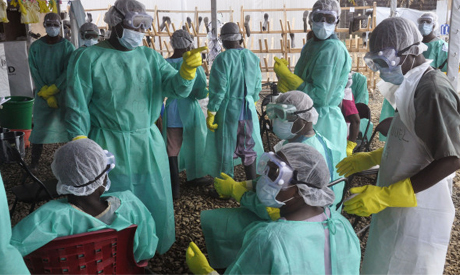
Health care workers inside a USAID, funded Ebola clinic with their Ebola virus protective gear in Monrovia, Liberia, Friday, Jan. 30, 2015 (Photo: AP)
Almost every child who has lost parents to Ebola is being cared for in their community, UNICEF said on Friday -- allaying fears that many would be shunned by relatives and neighbours.
The United Nations children's fund confirmed an estimate it gave last week that more than 16,000 children have lost at least one parent or main carer to the west African epidemic.
But less than three percent have been placed outside family or community care, according to UNICEF, which has appealed for $500 million to help Ebola victims and prevent fresh outbreaks as the epidemic abates.
"Since overcoming their initial fears and misconceptions about Ebola, families have been showing incredible support, providing care and protection for children whose parents have died," UNICEF regional director Manuel Fontaine said in a statement.
"This shows the strength of kinship ties and the extraordinary resilience of communities at a time of great hardship."
UNICEF said the outlook was particularly good in Guinea, where all 773 Guinean children who lost both parents had been placed with their extended families.
The outbreak has claimed almost 9,000 lives in Guinea, Liberia and Sierra Leone, leaving a smiliar number of children with just a single parent and some 3,600 orphaned. A further 3,800 have lost their main carer, UNICEF said.
The agency warned in September that bereaved children risked being shunned, with the outbreak "turning a basic human reaction like comforting a sick child into a potential death sentence".
UNICEF spokeswoman Sarah Crowe said in October the African system of extended family and friends taking on orphans -- particularly evident during the HIV/AIDS epidemic -- had "broken down" with the onset of Ebola.
"The numbers kept climbing in terms of kids who lost their parents so we needed to put in place a strategy to provide immediate care for those kids," Andrew Brooks, UNICEF's regional head of child protection for west Africa, told AFP in Dakar on Friday.
"And we were worried, it's true. There was a lot of conern and the fear was very real."
But the traditional reflex of families taking in orphaned children had endured, he said confounding the worst expectations that thousands of children would require centre-based care, he said.
Although there has been a decline in Ebola infections in recent months, the weekly toll of new confirmed cases rose in the last week of January, marking the first hike in 2015, according to the World Health Organization.
OCHA, the UN's humanitarian affairs office, has warned the international community to not be complacent over what it describes as "the most difficult phase" in the fight to eliminate the virus.
"I was told repeatedly by partners that the last mile in the fight against Ebola will be the hardest," director of operations John Ging said Thursday after a week-long visit to Ebola-affected countries.
"While remarkable progress has been made, we must not forget that it only takes one new case to start a new outbreak."
Short link: